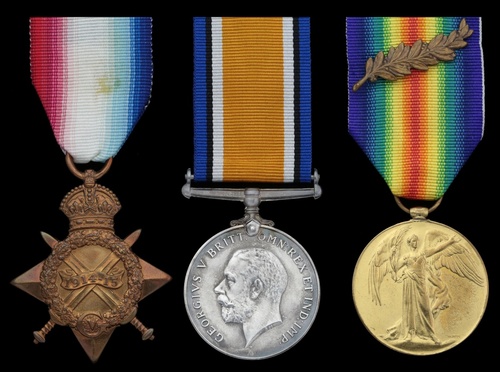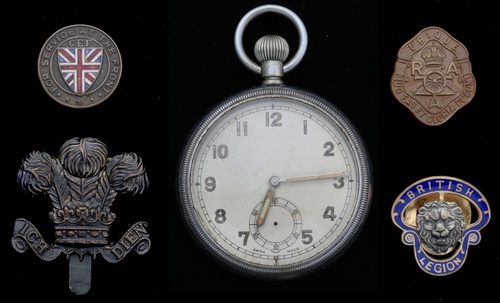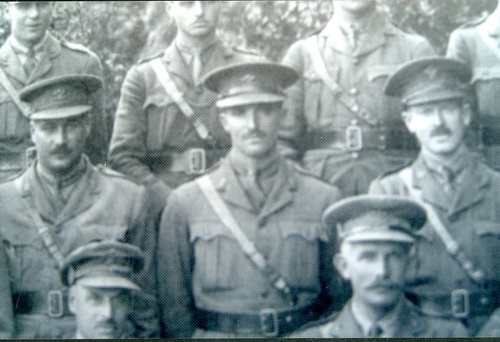Auction: 22103 - Orders, Decorations and Medals VII - e-Auction
Lot: 406
(x) Three: Lieutenant F. J. Smith, 15th Battalion, London Regiment (Civil Service Rifles), a keen footballer and one of the '17 March Men' who had the bad luck to be invalided in 1915 after breaking a bone during a game, later seeing Irish Service, being wounded during the capture of Beersheba and earning a 'mention', Smith would lose his life to flu on 30 October 1918
1914-15 Star (88. L.Sjt. F. J. Smith. 15-Lond. R.); British War and Victory Medals (Lieut. F. J. Smith.), with M.I.D. oak leaves, minor pitting to edge, overall very fine (3)
Francis John Smith was born at Bicester, Oxfordshire, the son of Frederick and Esthar Smith of 58 Market Place, Bicester. Joining the Civil Service at a young age Smith enlisted with the Civil Service Rifles as a reservist in 1906 and was working as a Second Division Clerk in 1911, while living at Bedford Park, London. A Lance-Sergeant when the Regiment was mobilised on 4 August 1914, Smith and entered the war in France on 17 March 1915 with 5 Platoon, 'B' Company, 1/15th Battalion. It wasn't long before he applied for and received a Commission on 2 April 1915, unfortunately Smith's career was about to take a serious setback as the Regimental History explains:
'In addition 2nd Lieutenant F. J. Smith, "A" Company, was so badly injured in a football match at La Beuvriere on the 2nd May against the Post Office Rifles, that he had to return to England. The loss of Frank Smith was keenly felt in the Battalion, of which he had been a member since 1906. As a Sergeant in "B" Company he was very popular, both with his brother N.C.O.'s and with the men. He was a thorough sportsman in every way, and his appointment to a commission in the Regiment only about a month before was very popular with all ranks.'
Back in Britain Smith joined 2/15th Battalion after a brief convalescence and was posted to Ireland in the wake news about the 1916 Uprising. The Battalion landed at Cork on 28 April 1916 and was sent to Macroom where they performed raids on suspected properties and other security duties before moving on Rosslare, via Millstreet where they re-embarked. After an uneventful time in France they were sent on to Salonika in November 1916. Held back from the Sarrail Offensive they saw little action here and left on 20 June 1917 for The Middle East. They arrived here in time for the attack on Beersheba in October 1917, with the Civil Service Rifles moving to join the line on 20 October. Heavy fighting up the Wadi Halgon on 31 October overcame the Ottoman positions though at a high cost, the diary of a C.S.R. man, Vic Blunt, takes up the story;
'Bullets were falling everywhere. Several of our lads were hit and I noticed one or two bowled over. In the excitement I didn't have the "wind up" one little bit. I just went on running, yelling, cheering and shouting out the Sergeant's orders at the top of my voice. every minute I was expecting a bullet to get me but my good luck stuck to me... When we got to the Turkish Trenches we jumped straight in and shot or bayoneted or took prisoner all that were there. I was lucky, the section of trench I jumped in was empty.'
Smith was wounded during the attack, suffering a compound fracture in his thigh. An extract from the Bicester Advertiser and Mid-Oxon Chronicle on 9 November 1917 notes 'the wounded officer has a compound fracture of the thigh, caused by gunshot. He is now in hospital at Cairo, Egypt'. Despite this for his gallantry in the fighting Smith received a 'mention' in General Allenby's despatch (London Gazette 16 January 1918, refers).
Nevertheless the bullet ended his career in the military, unfit for military service Smith was preparing to relinquish his commission for a role at Somerset House when he caught Spanish Flu. He died at the Central Military Hospital Bicester on 30 October 1918, he is buried at Bicester Cemetery. Tributes to him were not long in coming with his obituary in the Bicester Advertiser noting some of his achievements in civilian life:
'He was a great athlete, excelling in most sports and games, especially football. As an amateur he had been "capped" for England on several occasions. He was a member of the Civil Service Club and was considered one of the fastest amateur forwards in the Country. He has played for Oxfordshire, Middlesex and in a team representing London versus Paris.'
Sold together with several badges including a Civil Service Rifles cap badge, British Legion badge, a C.E.F. for service at the front badge, Royal Artillery Association and several others along with a pocket watch engraved 'F J Smith' to the reverse along with copied research including medal rolls, London Gazette entries and newspaper extracts as well as a copy of The Civil Service Rifles in the Great War, army lists and handwritten notes.
Subject to 5% tax on Hammer Price in addition to 20% VAT on Buyer’s Premium.
Sold for
£450
Starting price
£100









